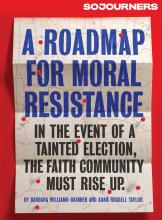MORE THAN A year ago, during the early days of Hong Kong’s anti-extradition bill protests, a Christian hymn echoed in the streets. “Sing Hallelujah to the Lord” had become an unofficial protest anthem. A year later, the spirit of hope that permeated the song’s adoption has evaporated.
This summer Beijing overrode the “one country, two systems” principle agreed to in 1997 by implementing a new national security law (NSL) in Hong Kong that gives China’s central government a broad set of powers to silence anything deemed subversive. The effects have been swift and chilling. In August, legislative elections for 2020 were delayed a year; pro-democracy candidates were disqualified. Controversial texts have been removed from public libraries, pro-democracy professors silenced, and newspaper offices raided.
Some of Hong Kong’s leading democracy activists, including legal scholar Benny Tai and Nobel Peace Prize nominee Joshua Wong, confess Christian faith. During the height of recent protests, many pastors invoked Christ in their participation. For example, pastor Roy Chan organized Protect the Children, a civilian peacekeeping collective, to shield young protesters from police violence. Under the new NSL, actions like Chan’s could be prosecutable, with potential life sentences.
Read the Full Article

